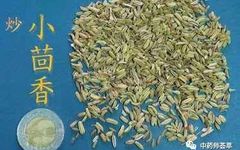Warming Yang herbs are used to treat interior cold syndromes, primarily functioning to warm the interior and dispel cold, also known as warming interior herbs.
Warming Yang herbs are mostly pungent, warm, and hot in nature; pungent can move and disperse, while warm can promote qi and blood circulation, effectively reaching the organs to warm the interior and dispel cold, and alleviate pain. They are effective for treating interior cold syndromes. There are two manifestations of interior cold syndromes: one is the real cold syndrome caused by the invasion of cold evil, leading to constrained Yang qi; the other is the false cold syndrome caused by Yang qi deficiency and the internal generation of Yin cold. Warming interior herbs are mainly used for the treatment of real cold syndromes, although some herbs can also be used for treating false cold syndromes and Yang collapse syndromes.
Among the diseases suitable for warming interior herbs, three syndromes can be observed in real cold:
① Cold evil invading the interior, constraining the Yang qi of the spleen and stomach, which can manifest as cold pain in the abdomen, vomiting, and diarrhea, at this time, herbs that primarily enter the spleen and stomach meridians and have the effect of warming the middle and dispelling cold to alleviate pain should be used, such as Fu Zi (Aconite), Gan Jiang (Dried Ginger), Rou Gui (Cinnamon), Wu Zhu Yu (Evodia), Xiao Hui Xiang (Fennel), Gao Liang Jiang (Galanga), and Hua Jiao (Sichuan Pepper);
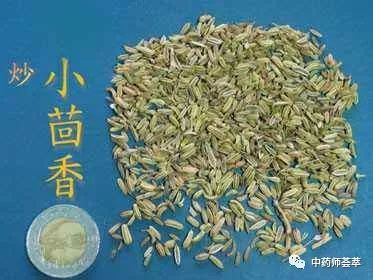
② Cold invading the liver meridian, causing cold hernia abdominal pain and muscle tension, can use herbs that primarily enter the liver meridian and have the effect of warming the liver, dispelling cold, and alleviating pain, such as Rou Gui (Cinnamon), Wu Zhu Yu (Evodia), and Xiao Hui Xiang (Fennel);
③ Cold phlegm entering the lungs, presenting with wheezing, coughing, and clear, thin phlegm, use herbs that primarily enter the lung meridian and have the effect of warming the lungs and transforming phlegm, such as Gan Jiang (Dried Ginger) and Xi Xin (Asarum).
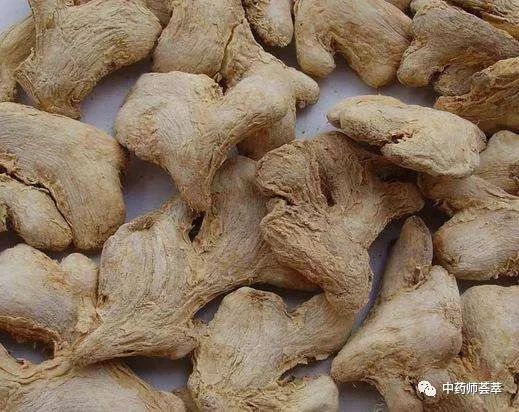
Gan Jiang (Dried Ginger)
For false cold, there are two syndromes:
① Kidney Yang deficiency, which can manifest as impotence, cold limbs, lower back and knee pain, frequent urination at night, and loose stools, use herbs that primarily enter the kidney meridian and have the effect of warming the kidneys and assisting Yang, such as Fu Zi (Aconite), Gan Jiang (Dried Ginger), Rou Gui (Cinnamon), Wu Zhu Yu (Evodia), and Ding Xiang (Clove);
② Heart and kidney Yang deficiency, presenting with palpitations, cold limbs, and difficulty urinating, should use herbs that primarily enter the heart and kidney meridians and have the effect of warming Yang and unblocking the vessels, such as Fu Zi (Aconite), Gan Jiang (Dried Ginger), and Rou Gui (Cinnamon); in more severe cases, where there is Yang collapse and reversal, with symptoms like profuse cold sweat, weak breathing, clear diarrhea, cold limbs, and a faint pulse, one should revive Yang and stabilize collapse using Fu Zi (Aconite) and Gan Jiang (Dried Ginger).
Yang supplementing herbs are used to assist the body’s Yang qi and treat Yang deficiency syndromes.
Yang supplementing herbs are mostly sweet, pungent, and salty in flavor, and warm in nature; since the original Yin and Yang of the kidneys are fundamental to the body’s qi, these herbs primarily enter the kidney meridian to supplement kidney Yang.
In cases of kidney Yang deficiency, clinical manifestations can include impotence, cold limbs, lower back and knee pain, premature ejaculation, infertility due to cold in the uterus, and frequent urination at night; all herbs that tonify kidney Yang can be applied, such as Lu Rong (Deer Antler Velvet), Zi He Che (Placenta), Xian Ling Pi (Epimedium), Ba Ji Tian (Morinda Root), Xian Mao (Curculigo), Zi Shi Ying (Quartz), Hai Gou Shen (Sea Dog Kidney), and Hai Ma (Seahorse).
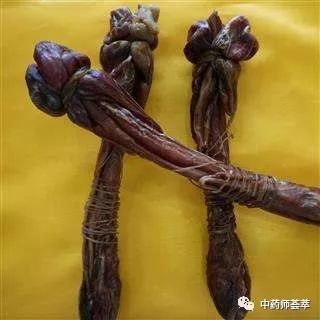
Hai Gou Shen (Sea Dog Kidney)
All five organs can have Yang deficiency, not limited to the kidneys.
Heart and kidney Yang deficiency can present with cold limbs and shortness of breath, and can use Hai Gou Shen (Sea Dog Kidney) and He Ma You (Toad Oil);
Lung and kidney Yang deficiency can present with inability to retain qi, weak cough, and spontaneous sweating, and can use Zi He Che (Placenta), Bu Guo Zhi (Psoralea), He Jiao (Gecko), He Tao Ren (Walnut), Chong Cao (Cordyceps), Zi Shi Ying (Quartz), and Hai Ma (Seahorse);
Spleen and kidney Yang deficiency can present with abdominal distension, preference for warmth and pressure, poor appetite, and loose stools, and can use Xian Mao (Curculigo), Bu Guo Zhi (Psoralea), and Yi Zhi Ren (Alpinia);
Liver and kidney deficiency, along with deficiency of essence and blood, can lead to dizziness, tinnitus, muscle weakness, and delayed closure of the fontanelle in children; can use Lu Rong (Deer Antler Velvet), Zi He Che (Placenta), Xian Ling Pi (Epimedium), Ba Ji Tian (Morinda Root), Xian Mao (Curculigo), Du Zhong (Eucommia), Xu Duan (Dipsacus), Tu Si Zi (Cuscuta), Sha Yuan Zi (Astragalus), and Jiu Cai Zi (Chive Seed).
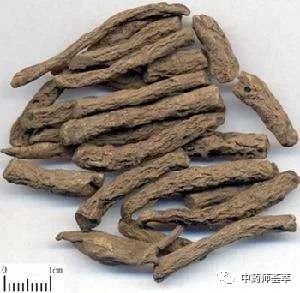
Xian Mao (Curculigo)
Warming herbs like Jiang (Ginger), Fu (Aconite), and Gui (Cinnamon) primarily stimulate the release of Yang qi; these herbs are mainly pungent, which generally has a strong stimulating effect, primarily serving to activate and release the Yang substances within the body, thus acting quickly. However, because they only have a stimulating effect, if the body cannot effectively and continuously store Yang substances, meaning synthesizing Yang substances, long-term use will result in poor warming Yang effects, which is why warming Yang herbs cannot be used long-term. The reason why Shen Qi Wan (Kidney Qi Pill) needs to add Yin nourishing herbs is that the Yang substances stimulated by Fu and Gui can effectively synthesize essence, serving as a reserve of Yang substances that can be released slowly. Fu Zi (Aconite) is used as an emergency medicine in TCM to stimulate Yang qi in critical situations to help the patient through Yang deficiency; it is easy to release Yang substances instantly, but instant synthesis is impossible, as manufacturing requires a process.
Herbs like Tu Si Zi (Cuscuta) and Xian Mao (Curculigo) have both stimulating effects and primarily synthesize Yang substances, which is reflected in their tonifying properties. Since synthesis requires time, the tonifying effect of Yang is relatively longer; however, because these herbs also have pungent properties and stimulating effects, they can also have warming Yang effects in a short time, but their main function is to produce Yang substances in the body, allowing for longer and slower use.
Many Yang substances are related to neurotransmitters; warming Yang herbs primarily promote the release of neurotransmitters for immediate effects, while Yang supplementing herbs primarily synthesize neurotransmitters for storage and slow release. However, because Yang supplementing herbs often have pungent properties, such as Xian Mao (Curculigo), they also have some warming Yang effects, which is why they are classified as Yang supplementing herbs, possibly due to their synthesis being the main action.
Additionally, it is important to note that the body’s Yang qi or essence cannot be supplemented through herbs; it can only be stored through the spleen and stomach’s transformation of the qi from food and grains. The ingredients in Shen Qi Wan (Kidney Qi Pill) are not Yin nourishing; in fact, the herbs generally considered Yin nourishing only include two types, Sheng Di (Rehmannia) and Shan Zhu Yu (Cornus), and Shan Zhu Yu is warm in nature, while Sheng Di has a stronger effect of clearing heat. Shen Qi Wan is a formula that warms and circulates Yang qi throughout the body, not just targeting the kidneys. Once a person is ill, the entire Yang qi of the body will be stagnant and obstructed; if the organ functions are still acceptable, the pathways from the kidneys to the spleen and stomach to the lungs to the Tai Yang can be opened by themselves, and the illness will resolve; if not, medicinal assistance is needed.

